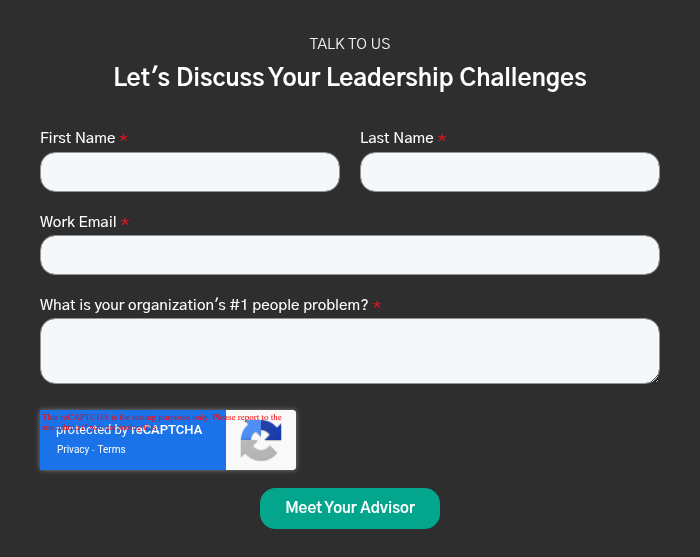Why is Emotional Intelligence (EQ) Important in Today’s Workplace?
August 26th, 2024
5 min read
By Cyndi Gave

The strength of any company truly lies in its people. Emotional Intelligence (EQ) is what helps us navigate the complex web of human emotions—both our own and those of others. It’s the ability to recognize, understand, and manage emotions, while also influencing the emotional responses of those around us. Sounds straightforward, right? But anyone who’s worked in an office where EQ is in short supply knows that the reality is far from simple.
In this article, you will learn how our program, The Emotional Intelligence Journey™, provides a comprehensive understanding of the emotional intelligence in your work environment. You'll also discover how this approach empowers leaders to identify strengths, uncover areas for growth, and develop the emotional intelligence crucial for navigating modern leadership with authenticity and influence.
While everyone can easily spot the extreme examples of workplace outbursts, the real opportunity to move the productivity needle with EQ training often lies in the more subtle, yet common, situations.
Picture this: You're in a team meeting, and you can just feel the disconnect in the room. Karen, a high performer from IT, is leading an informational session on some new software. It’s her first time presenting to a large group, and unfortunately, her message is not being received by the group. Meanwhile, the meeting starts to drift off course as stronger personalities in the room begin questioning the need for the new software. Before you know it, the session has gone completely off the rails, and poor Karen is left standing at the front like a deer in headlights.
As a leader, what do you do? How do you give Karen the tools to communicate more effectively in these settings? How do you ensure the stronger personalities in the group display empathy? And perhaps more importantly, how do you prevent a repeat of this meeting fiasco in the future? This where effective EQ training comes in.
So, while EQ might seem like a "soft skill" on paper, in practice, it's the bedrock of a healthy, functional, and thriving workplace. High EQ isn’t just a nice-to-have—it’s a must-have if you want to avoid the drama, keep your projects on track, and maintain a team that’s as strong as the roots of your company.
History of Emotional Intelligence (EQ) in the Workplace
In "The E.Q. Edge," Stephen J. Stein and Howard E. Book outline five key pillars of EQ: Self-Perception, Self-Expression, Interpersonal, Decision Making, and Stress Management. These pillars are essential for fostering a productive and harmonious work environment.
Why is EQ critical? Teams with high EQ demonstrate better collaboration, fewer conflicts, and higher overall productivity compared to teams with low EQ. Unlike traditional measures of intelligence, such as IQ, which focus on cognitive abilities, EQ emphasizes emotional and social skills. This distinction is crucial as it underscores the importance of interpersonal dynamics and self-awareness in professional settings.
Here at The Metiss Group, we specialize in empowering our clients through EQ leadership coaching with certified EQ-i and EQ360 trainers. This innovative approach focuses on enhancing a person's emotional intelligence (EQ) in the context of leadership development.
Impact of Emotional Intelligence (EQ) on Workplace Dynamics
High Emotional Intelligence significantly impacts team dynamics and collaboration. Research published in the Harvard Business Review indicates that teams with high EQ are more innovative and adaptable.
For example, at The Metiss Group, we have seen that teams who undergo The Emotional Intelligence Journey™ are better at conflict resolution and problem-solving.
It is not uncommon for our clients, after completing The Emotional Intelligence Journey™, to experience a substantial reduction in internal conflicts along with notable improvements in project turnaround times.
Leadership and Emotional Intelligence
Emotional Intelligence plays a vital role in effective leadership, especially for mid-size organizations.
Leaders with high EQ can inspire and motivate their teams more effectively, leading to higher engagement and lower turnover rates.
At The Metiss Group, we coach leaders to develop and demonstrate EQ through our tested and proven coaching programs. By cultivating empathy, self-awareness, and effective communication, leaders create stronger, more cohesive teams that are ultimately more productive.
The Emotional Intelligence Journey™ Addresses Employee Well-being
The Emotional Intelligence Journey™ contributes significantly to employee well-being and mental health, which are often overlooked components of workplace productivity. A 2021 study by the American Psychological Association found that employees with higher EQ experience lower stress levels and higher job satisfaction.
This connection is crucial because stressed employees are less productive and more likely to burn out. Imagine Sarah, a project manager juggling multiple deadlines. Without the right emotional intelligence skills, she might struggle to manage her stress, leading to missed deadlines and increased tension with her team. Over time, this stress could cause her to become disengaged, resulting in burnout.
Or consider Jason, an employee who frequently finds himself overwhelmed by the demands of his job. Without the ability to manage his emotions, he may lash out at colleagues, creating a tense work environment that hinders collaboration and lowers overall team productivity.
Implementing EQ training helps individuals like Sarah and Jason better manage workplace stress by providing tools to recognize and regulate their emotions.
With improved emotional intelligence, Sarah can approach her workload more effectively, prioritizing tasks and communicating her needs to her team, reducing her stress and improving her performance. Jason, on the other hand, learns to respond to stressors with composure, fostering a more positive and productive work environment. By equipping employees with these skills, organizations can cultivate healthier, more resilient teams, where employees are better equipped to handle challenges without succumbing to burnout.
The Emotional Intelligence Journey™ Assists Recruitment and Training
Assessing Emotional Intelligence during the hiring process is essential for building a strong, collaborative team. Organizations can use behavioral interviews and EQ assessments to evaluate candidates' emotional and social competencies. Once onboard, effective training programs are necessary to develop EQ in employees.
At The Metiss Group, we offer both a The Hiring Process Coach™ and The Leadership Essentials Playbook™ from an EQ lens that can transform workplace culture, elevate retention and ensure buy-in is optimized throughout all levels of the organization.
Performance and Productivity Improves With The Emotional Intelligence Journey™
At The Metiss Group, we have seen firsthand how EQ training leads to tangible improvements in workplace productivity. For example, One of our client testimonials states, “The Metiss Group has helped create nothing short of an evolution in my company. Our literal bottom line says it all: in five years, we quadrupled revenue and now enjoying major growth for the foreseeable future”.
Evolving Emotional Intelligence in A Remote Work Environment
The shift to remote work has heightened the importance of Emotional Intelligence in the workplace. Initial challenges, such as reading tone in texts, emails, and other messaging platforms, highlight the need for strong emotional and social skills in a virtual workspace. For example, a simple "Sure." in an email could be interpreted as agreement, indifference, or even sarcasm, depending on the recipient’s mood and context. Or think about the last time you received a brief, curt response in a chat—did you wonder if the sender was annoyed or just in a hurry? These kinds of misunderstandings can escalate quickly without the right EQ skills to manage them.
As people now return to offices, maintaining and enhancing EQ remains vital. Strategies such as regular virtual check-ins, empathy training, and conflict resolution workshops can help remote teams navigate interpersonal dynamics effectively.
Additionally, as organizations implement hybrid and other back-to-office mandates, developing EQ skills from leadership down to the rank and file is critical in maintaining a harmonious environment. This allows people to thrive as individuals, come together in teams, and produce the highest quality of deliverables for the organization. A win-win for everyone!
Empowering Emotional Intelligent Leaders with The Emotional Intelligence Journey™
The evolution of Emotional Intelligence (EQ) has become a cornerstone of modern workplace success. As organizations continue to adapt to changing dynamics—be it remote work, hybrid models, or evolving team structures—the ability to navigate emotional landscapes is more critical than ever.
By integrating EQ into leadership development, team collaboration, and recruitment processes, companies can foster a more engaged, resilient, and productive workforce.
At The Metiss Group, our commitment to enhancing EQ through comprehensive coaching and training has proven to drive meaningful improvements in workplace culture and performance.
Now that you understand the importance of EQ in today's workplace, the next step is to contact The Metiss Group to discuss your people challenges and find a solution. Just fill out the form below to get started.

Topics:







